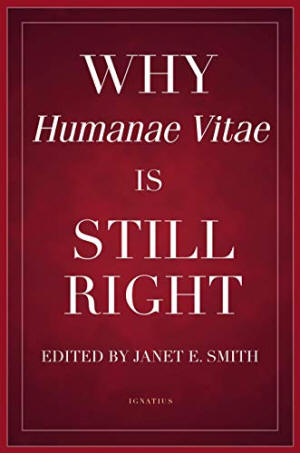Catholic Medical Quarterly Volume 70(3) August 2020
Book Review
Why Humanae Vitae is Still Right.
Edited
by Janet Smith. Ignatius Press 2018
Reviewed by The Rev Prof Patrick Pullicino
 This
collection of essays under the editorship of a well-known champion of Paul
VIs encyclical, is a timely call to arms on contraception and Humanae
Vitae.
This
collection of essays under the editorship of a well-known champion of Paul
VIs encyclical, is a timely call to arms on contraception and Humanae
Vitae.
Mary Eberstadt underscores the prophetic power of Humanae Vitae and says “Humanae Vitae does not burn” despite all those trying to relativise it in the Catholic Church. Deborah Savage says that the dignity of woman cannot be understood in any real sense apart from her natural capacity to bear and nurture life. Uju Ekeocha, the founder and head of Culture of Life Africa decries the rhetoric that population explosion in Africa is a cause of famines. She wrote an outraged letter to Melinda Gates because of ongoing her plan to spend $5 billion to ensure that African women’s fertility was blocked by contraception, and says that this is racism, imperialism, and colonialism disguised as philanthropy. Christopher West recalls the Fatima warning relayed by Sr Lucia that the decisive battle between the kingdom of Christ and the Satan will be over marriage and the family, and that it is taking place today through contraception.
There are chapters on the Theology of the Body and Biblical underpinnings of Humanae Vitae. A new redaction of the ethical norms of conjugal life by a group of theologians from Krakow which was headed by Karol Cardinal Wojtyla gives an exposition on the place of natural law in the Church’s teaching on contraception. Maria Fedoryka gives a personalist view to show that only productive love “union plus fruit” equals love.
Janet Smith herself writes three chapters, one on Natural Sex, that shows why intercourse without procreation is confusing and leads to destructive and perverse practices and that true love and holiness cannot be thereby achieved. Her second chapter is concerning the Sensus Fidelium and contraception. Many priests and bishops are reluctant to preach against contraception because the majority of Catholics in the West approve of and practice it. Ms Smith shows that Catholic theologians are wrong to take this widespread acquiescence as a Sensus Fidelium. Newman believed that the few, “grex parvus” who have the power to remain faithful to Church teaching, and who know and live their faith, are the ones that affirm the wisdom of the Church concerning sexual morality and who should be listened to. She has a third chapter on how important right conscience formation is both for Catholic laity and physicians and that it is not being taught.
This book is a challenge to all levels of the Catholic faith to rethink the terrible damage that contraception is doing to society, to our religion and to our relationships. Bishops and priests cannot be cowed by the apparent Sensus Fidelium, but must defend this ongoing attack on families by proclaiming Humanae Vitae is still right.
